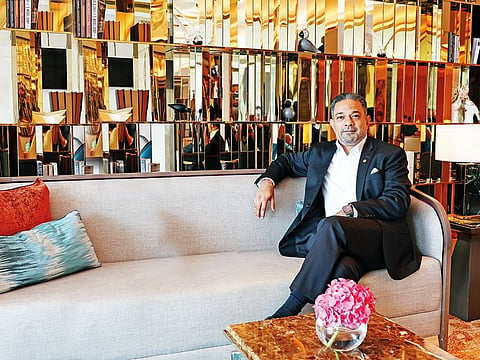Every decision we make is about our guests, says Ranjit Phillipose of the Taj Exotica Resort & Spa
Ranjit Phillipose of Taj Exotica Resort & Spa shares lessons he has learnt over the years

‘The one most important lesson I’ve learnt in my career as a hotelier?’ asks Ranjit Phillipose, echoing my question. ‘It is to take care of your associates. Because if you take care of your associates, they will take care of your guests well.’
Clearly, it is a lesson that is reaping rich rewards. For, over the years, the Taj Group of hotels has been winning honours, accolades and awards for excellence in the hospitality industry. To name just a few: Bombay Brassiere was named Second favourite Indian restaurant in a Reader’s Choice awards a few years ago; The Taj Mahal Palace, Mumbai took the Best Iconic Asset at the Worldwide Hospitality awards in 2021 and the Taj Falaknuma Palace, Hyderabad (whose restoration Ranjit overlooked and was the opening GM of the Palace) lifted the Best Heritage Hotel award.
Ranjit himself is a multi-award winning hotelier with over 30 years of experience. The Area Director – Middle East, and General Manager of the Taj Exotica Resort & Spa, The Palm Dubai has an arm-long list of professional achievements including being listed in Hotelier Power 50 and Caterer Power 50, among others. He also oversaw multiple hotel openings and rebranding projects across the Indian Hotels Company Limited (IHCL) in Asia, the UK, the US, and the Middle East.
We are seated in a plush and well-appointed meeting room in the breathtaking Taj Exotica Resort & Spa, on The Palm Dubai which offers spectacular views of the sea on one side and Dubai’s impressive skyline on the other.
I am keen to know more from the seasoned hotelier on how he has helped develop and position Taj properties pretty much across the globe as one of the most popular and desirable destinations for tourists and businesspersons – not to mention attract couples and families to make the Taj Exotica Resort & Spa a wedding destination magnet. That last one is something Ranjit is proud of and quick to share.
‘In just 18 months we have hosted close to 30 weddings here,’ he says with a smile. ‘And all of them were big, fat, beautiful weddings.’
The delicious food, he says, is a main reason families choose to host a wedding here. ‘We do just about every cuisine they may request. And if there is a request for a cuisine that we might not have specialized in, we arrange to fly in chefs from our hotels who have the expertise in that particular cuisine.’
Another reason is the fact that the team at the hotel is well-experienced in hosting weddings, particularly Indian weddings.
‘We are well aware of the various ceremonies that are part of Indian weddings and can arrange them so families do not have to take any stress. They can rest assured that everything will be taken care of,’ he says. A dedicated wedding specialist is also at hand for ironing out wrinkles, if any.
Ranjit makes it clear that the fundamental driving principle in the business is– hospitality. ‘Hospitality is key. It’s also a business. But guests are at the centre of every decision we make. We make sure our guests will have the most exquisite experience.’
Apparently there is a name for it in the Taj group. ‘We call it Tajness. We spent years perfecting our craft, decades earning a reputation and centuries building a culture.’ That, says Ranjit proudly, is Tajness.
His view of what needs to be provided to guests is clear, and it’s a message that percolates down to the associates at every layer of the hierarchy. ‘Being in a place like Dubai where everything is bigger, bolder, shinier, brighter… the one thing that will make us stand out is the service that we deliver to our guests. And I look at two stakeholders– the guest and my associates– and keep them as top priority.
MOVING UP THE RANKS
Starting his career with IHCL in 1993 at the Taj Coromandel Hotel in Chennai, India, Ranjit rose up the ranks moving to UK to St James’ Court, London, before playing a major role in opening Taj hotels in Mumbai, Seychelles, Mauritius, and the US.
One of his more memorable– and equally challenging– role was working on restoring the Falaknuma Palace in Hyderabad and transforming it to the now legendary Taj Falaknuma Palace hotel.
‘We had a few other palace hotels in Rajasthan in India. But this was the first in southern India,’ says Ranjit, recalling his appointment as general manager of the Taj Falaknuma in 2009 to oversee the $50million restoration project of the brand’s fourth heritage hotel. ‘Some of the restoration works we have done at the palace were truly mind-boggling,’ he says.
To illustrate, he lists the example of how they worked on the carpets in the Palace. ‘Most carpets are dyed perhaps 50 times to get a rich colour. But the carpets at the Falaknuma Palace were dyed 300 times to get the shade that was as close to the original!
‘We also had the longest dining table there– one that could seat 100 people.’ Having the table is one thing; coming up with a service plan to serve 100 people at the same time is a completely different kettle of fish. ‘But we did it and it was a magical experience.’
The magical experiences continued in several other locations that Ranjit was posted to. He remembers moving to a Taj property in the Maldives– ‘from an opulent palace to a beautiful resort on a small cute island. We had numerous repeat guests and they ended up becoming more than guests; they were your friends and family.’
His stint at the Taj Exotica Resort and Spa Goa as General Manager and Area Director was also replete with several magical moments including managing and hosting several dignitaries and heads of states during the BRICS summit that was held there in 2016. ‘Indian Prime Minister Narendra Modi too was there and I remember waiting to receive him and he wishing me because it was my birthday that day,’ says Ranjit. ‘That was a fantastic and unforgettable experience.’
SHIFTING TO DUBAI
For Ranjit, moving to Dubai was a ‘gorgeous experience’. Establishing a hotel in the Business Bay area, then opening one in JLT before throwing open the doors to the resort on the Palm were fulfilling and cherished moments, says the hotelier who Forbes this year listed as one of the most influential leaders in the region’s travel and tourism industry.
So, what’s the second lesson he has learned over the years in the industry?
‘The need to be agile and to learn to adapt very quickly to changing scenarios,’ says Ranjit. Often, situations could develop quite suddenly and take everyone by surprise, but learning to quickly come to terms with the situation and get on top of it is crucial to stay ahead.
The ability to adapt is key, he says, recalling how the pandemic threw a spanner in the works for businesses and people across the world.
‘When the pandemic broke, I called in my senior team and one of the first things I mentioned was that we would do whatever it took to protect our staff’s livelihoods,’ he says.
‘My team came up with fantastic ideas; we innovated hugely during those tough Covid times, and by the time it blew over, we had not let go a single person.’
He ensured that expat staff were provided with company accommodation, and food and daily supplies so that they could use their salaries to provide for their families back home and at the same time remain safe.
The pandemic, says Ranjit, reinforced the need to be agile, and have empathy. ‘Empathy is so important, especially in today’s fast-paced world where things and situations are changing constantly. Being empathetic with your people makes life very, very easy.’
Another guiding principle in Ranjit’s book of success is being open to learning from ‘everyone you meet and associate with. I have learned from some great general managers from different parts of the world. I’ve learned all the good things from them. And things I shouldn’t do,’ he says with a smile.
Living and working in countries across the globe has also been a huge learning curve. ‘I’ve worked in different continents, and with different nationalities. They all had something really special about them and I learned from each one of them– what I should do, and also, importantly, what I should not.’
NUMBERS ARE CRUCIAL
As in any business, numbers, he admits, are very important. Setting targets and pushing your team to achieve them is an art that is fine-tuned with experience.
As important as knowing your numbers is knowing where you are headed, he says. ‘You have to have a vision for the future, which could be one year, five years, or more.’
As a leader, I may not have all the answers. But as a leader, I need to make sure that the people around me are experts in their fields. This way, together we can take on any challenge.

Ranjit believes it is important to break down a large goal into small achievable goals and work towards achieving them while always having the big picture in mind. ‘Those small steps are crucial because when you reach those small milestones you should celebrate them. That’s important and boosts morale.’
Another key lesson he has learnt is the importance of surrounding oneself with people ‘who are better than you in some way.
‘That’s so very important,’ says Ranjit. ‘As a leader, I may not have all the answers. But as a leader, I need to make sure that the people around me are experts in their fields. This way, together we can take on any challenge.’
‘It doesn’t threaten me; it only makes me stronger. And together I think we make a huge difference.’
He uses an analogy to drive home his point. ‘Each finger of our hand is different. But when you make it a fist it can be a powerful tool.’
A MELTING POT OF NATIONALITIES
What are his views of the hospitality sector in this region?
‘It’s awesome to see the number of nationalities here. This is a city that is so cosmopolitan, and not just in the guests that arrive here. Our staff too is a mix of nationalities– 42 at last count,’ he says, proud of the diversity in the workforce.
As a global player, it’s important that the team is able to serve every nationality, he believes.
Ranjit is well aware that the sector is very competitive. ‘And I love that. Healthy competition is important because it pushes you to do better.
‘This city makes you get better and better. It is a very innovative city and the people here are constantly pushing the limits to get better and more innovative. I think the limits of what we can do and achieve is only limited by our minds.’
Sign up for the Daily Briefing
Get the latest news and updates straight to your inbox




